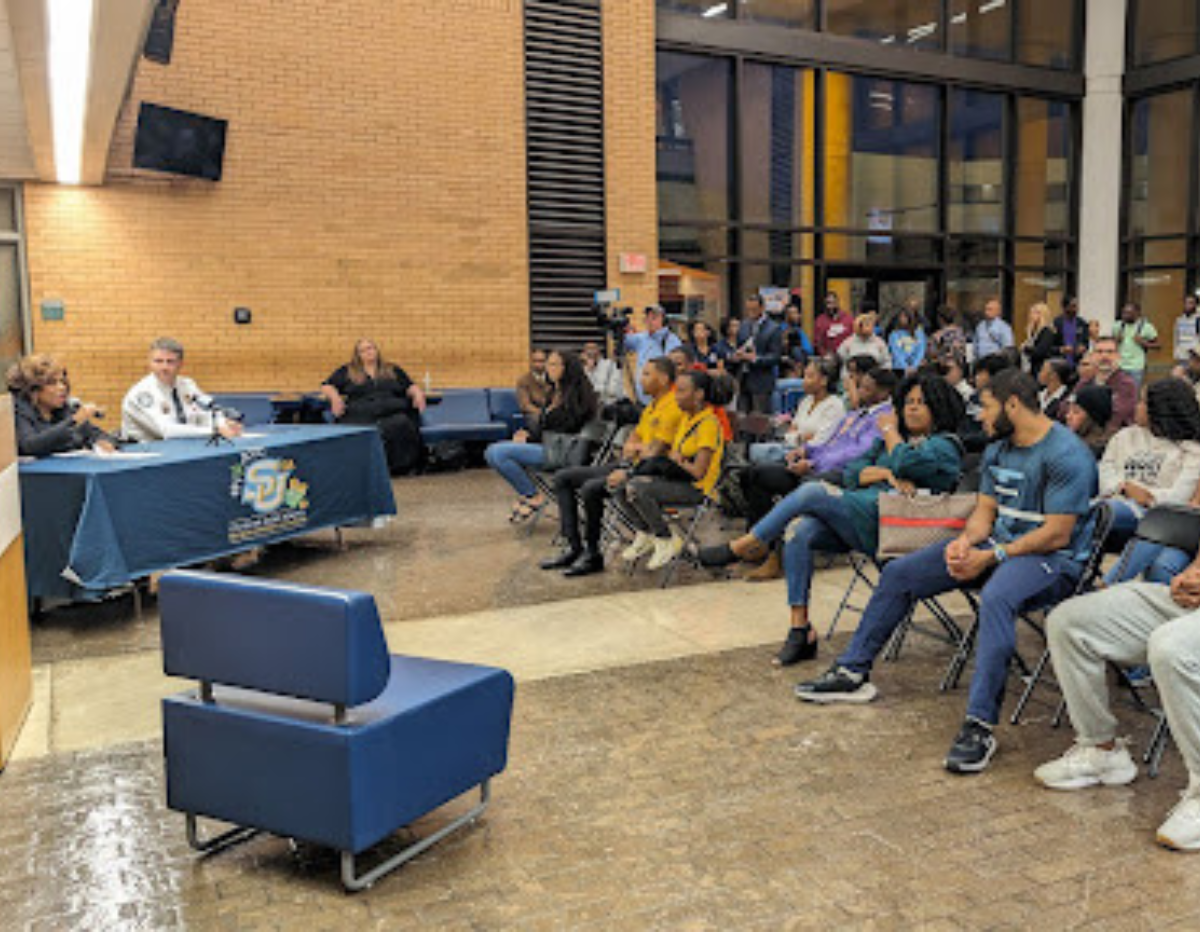
EJUSA was honored to partner with the Baton Rouge community on a special event convening local youth to hear from and question the city’s police chief. Youth voices are so important in conversations about public safety, so we’re grateful that Chasity Joseph, a youth leader, offered to share her thoughts on the event.
Our Ask the Chief event was held to introduce our new chief of police, Thomas S. “TJ” Morse, Jr., chosen by Mayor Broome of Baton Rouge, to students at Southern University and Agricultural & Mechanical College (A&M). The goal of this event was to encourage open discussion regarding public safety and policing with Black youth at our HBCU (historical black colleges and universities). Students had the opportunity to gain insight into recruitment opportunities such as internships, programs collaborating with nonprofits, and policies the new chief and Mayor Broome are promoting in our community.
We were joined by EJUSA’s Josie Alexander and Kristina Dezendorf as well as Dr. Kristie Perry and I had the opportunity to facilitate the discussion between my peers and the members serving our communities. Being the student moderator for the Meet the Chief Event was a truly rewarding experience. Mayor Broome of Baton Rouge shared a ton of important information regarding the approximately 20 programs currently in place, from the ReCast program aimed at community-based culturally specific health resources (Substance Abuse and Mental Health Service Administration, 2023), to ALICE highlighting and informing on families working towards financial stability (Louisiana Association of United Ways, n.d.) and the Safe Hopeful and Healthy program that “develops a collective vision and strategy to strengthen coordination, capacity, and partnerships to address the root causes of violence, and to advance policies and practices.” (Safe Hopeful and Healthy Baton Rouge, n.d.).
Our new chief of police, Thomas S. “TJ” Morse, Jr., emphasized the efforts being made to promote communication between nonprofits working to target similar goals so that they can rally against their common causes during monthly meetings at the downtown library. Through this event, I got to learn about concepts like community-centered public safety ecosystems and the 21st-century model of policing.
According to EJUSA, public safety ecosystems are the social and cultural, community-led, political and institutional, and system-led strategies that contribute to an ecosystem that works together to create overall safety and better quality of life.
The International Association of Chiefs of Police (IACP) defines 21st Century Policing strategies as internal and external practices designed to help agencies promote effective crime reduction while building public trust and safeguarding officer well-being (The International Association of Chiefs of Police, n.d.). I’m particularly excited about the youth council that Chief Morse proposed to act alongside his current advisory council in discussions around issues pertaining to the city.
This event had one of the best student turnouts I have seen for an event of this kind. Students really took the initiative to ask difficult questions related to gun violence, police training, and addressing bias in the system. Some of these included the following: What is being done for gun control policies in the city of Baton Rouge? What is the duration and requirements for police training? Are there plans for supplemental training to be enforced?
With police training only being eight days, the news that our new chief would be pushing for more foundational training was welcomed. A student in the My Sister’s Keeper (MSK) chapter also made note of the representation of police at this event, which was mainly Black officers when the majority of police that students at HBCUs like Southern University and A&M College are concerned about aren’t Black. This highlights the importance of diversifying discussions and establishing a safe space to voice ways that we can improve.
Chief Morse was more than open to emphasizing inclusive discussions and ensuring there is better representation moving forward.
A quote that Chief Morse shared that stuck with me was,
“The police are the public and the public are the police; the police being only members of the public who are paid to give full time attention to duties which are incumbent on every citizen in the interests of community welfare and existence.” ― Robert Peel
This quote in particular exemplifies the ideal version of policing for communities. Given the current tone of my peers, there is a fracturing relationship between Black communities and the police. Notably, Cop City in reference to Atlanta, has raised concerns for police militarization taking place in minority communities across the United states.
From our event I have taken away that indeed there is room to bridge the disconnect but only if community voices and more developmental training practices are truly the foundation for policing. It is important to note that Black communities have consistently been vocal about reform that emphasizes de-escalation and embodies community efforts towards welfare. However, historically our communities are not who the police have considered “the public” in which they represent. Our Meet the Chief event was in essence a promising foundation for ensuring representation of our community and understanding that public safety is a joint effort built upon establishing relationships.



